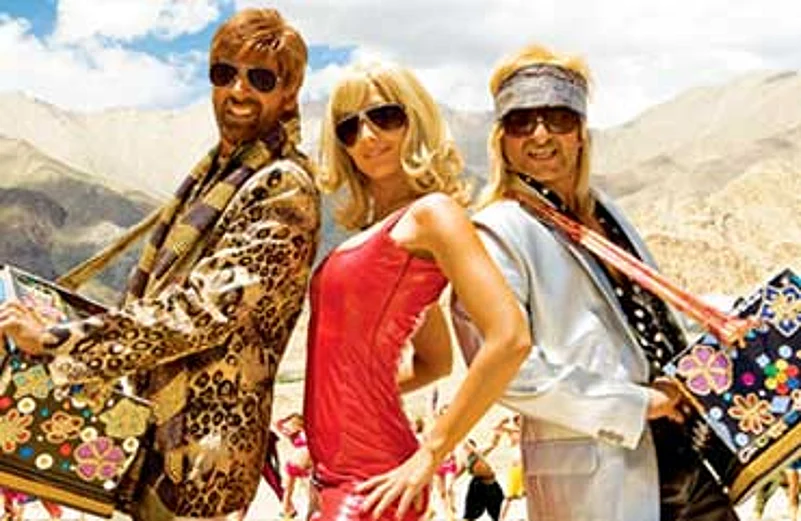Namrata Joshi's is perhaps the best review of all those panning Tashan: unlike most of her peers,she has an eye for the film's "smugness", that is to say itsself-conscious nod to its masala roots, and is surely right when she saysdirector Vijay Krishna Acharya has a tendency to lull the writer in him into adeep sleep (to her credit; most other reviewers have trashed the film on thesame grounds--a wafer-thin plot; implausible characterization; poor dialogue--that don't seem to give them pause where other films are concerned (contrastthe generally favorable reviews a farce like Race received), suggestingthat something other than the film's thin storyline might have ticked them off.As for what that might be, and why and how there's a lot more at work in Tashanthan Ms. Joshi has given it credit for, the answer lies in Kanpur--not somuch the real-life industrial city that has seen better days, but the Kanpur of(Acharya's) imagination, a city "representative" of the heartland, andof a state of mind that might seem anachronistic in contemporary Hindi cinema.
Advertisement
There's little doubt that Tashan isdeeply mindful of the cinematic tradition it is heir to, but it would be amistake to think of Tashan as a "retro" film, unless by that term onerefers simply to any film that is conscious in this way, or one means simplythat the director in question has great affection for the films he grew upwatching. Both of these are manifestly true of Tashan, but the film isno mere homage, nor is it smug in the "Look at how many films I'vewatched" way Quentin Tarantino has mastered. For homage,ironic distance from the past one wishes to not so much capture but allude to isan essential ingredient. Think Bluffmaster! or JhoomBarabar Jhoom, each of which made reference to the Bollywood past, but useda combination of humor and affectionate remembrance to drive home the point thatthe films, the mood, were pretty darn good way back then--but that thepast is irremediably past.
Advertisement
Tashan is in fact a rarer bird: it plays itstraight, essentially seeking to present a masala movie in 2008 garb.But what separates it from the likes of, say, a Halla Bol, isAcharya's instinct for packaging designed to appeal to contemporary multiplexaudiences (by now, sadly, the only audiences that seem to matter to the Hindifilm industry), and his breezy--albeit uneven--humor. Notto mention a sensibility far removed from the earnestness of Raj Kumar Santoshi:whereas Halla Bol seemed to hope that upwardly mobile audiences wouldoverlook a cinematic idiom that seemed to be past its sell by date, Acharyaseems well aware of the challenge before him. Indeed, Acharyarenders the challenge explicit by making a film that is unabashedly on the sideof the bhaiyya--specifically, one called Bachchan Pandey (AkshayKumar)--cheerfully excluded from fluency in English (anabstraction given flesh in the form of Jimmy (Saif Ali Khan)), and set againstthe course of over a decade of Bollywood history. Thissensibility is not just a question of dialect (although Tashan includesliberal doses of what I am told is--but wouldn't recognize as--Kanpur'sHindi dialect) or of a character who isn't a yuppie from a major metro, or of astory that doesn't unfold in New York or Sydney or London. Rather, it is a question of an entireworldview: by privileging Bachchan Pandey's character, and (more importantly)his story, and by ensuring that only the Kanpuriyas have a "history"in this film, Acharya privileges the Ganga kinaare waala ethos (whetherreal or imagined; or, more appropriately in the context of a cinematic traditionstretching back at least to the Bachchan song of the same name in Don,imagined and real), and puts "the heartland" at the core ofHindi cinema in a way we haven't seen since Bunty aur Babli--and in afar more explicit, and (given the tastes of contemporary Bollywood audiences)courageous manner than Shaad Ali's 2005 laugh romp.

I wrote above that this sensibility is notsimply a question of dialect--equally, however, the question of language isnever very far from this film's lead male characters, each of whom has seriouslanguage issues. For instance, Acharya is acutely consciousof the privileged status Jimmy's access to English bestows upon him--not onlyis he a call center executive but an English-language instructor, the sort whogrants Indians access not to the wealth of English literature or Anglo-Americanthought, but to the opportunity to serve customers who expect English to be theworld's lingua franca. But Jimmy's privilege isn'tsimply because of the greater demand for his services in India's new economicparadigm; as the reverence of Bhaiyyaji (Anil Kapoor) for Jimmy's well-turnedout English phrases makes clear, to speak like Jimmy in the new India is to bethe new (and uber-) Brahmin, potentially able to intimidate eventhose north of one on the totem pole of wealth and power. BachchanPandey is the opposite of Bhaiyyaji: for him, Jimmy's facility with English isitself suspicious, a sign of insufficient Indianness. ForPandey--who, in his name, incarnates two larger-than-life U.P. waalas, Hindicinema's biggest star and the 1857 sepoy who graced our cinema screens only afew years ago--and, one suspects, for Acharya, the "real deal," the"asli" Indian, cannot be found in the India of the call centersand the shiny malls, but in the sort of galee where boys stealelectricity to impress girls (watch the film, you'll see what I mean).
Advertisement

Itna aagay nikal gaye, aur ab tak story kebaare mein nahin bataaya? Skirt chaser Jimmy falls forPooja Singh (Kareena Kapoor, more skeletal than sex symbol, and miles removedfrom the kohl-rimmed hotness of Asoka) at first sight, and agrees to giveher private English classes--except the classes aren't for her but for herboss, a U.P. don called Bhaiyyaji (Anil Kapoor) with an addiction to brokenEnglish. Jimmy and Pooja fall in love (or so he thinks),until one 25-crore scam and one irate gangster later, Pooja is on the run,Jimmy's getting the living daylights beaten out of him by Bhaiyyaji's henchmen,and bounty hunter Bachchan Pandey is on the money's trail. Thethree meet up and hit the road together, and by film's end we have (mediocre)action sequences, khoya hua bachpan ka pyar, and two extended flashbacksset in Kanpur's lanes (one of which bizarrely erupts towards the end of thefilm). In short: paisa vasool for this viewer.And then some.
Advertisement

Acharya's debut film is unquestionably superiorto the last action/adventure film featuring two male leads and a female thief hewas involved with--while both Dhoom 2 (which Acharya wrote) and Tashan suffer from egregiouswannabe moments, the latter has genuine soul at points, and is never merelyplastic (at least if you exclude song videos like Chaliya, Yash RajFilms' latest ill conceived attempt to manufacture sexiness by means of skimpyclothing). Not to mention that it features far better visuals(a large share of the credit for which must doubtless go to cinematographerAnayanka Bose), music, and dialogue than 2006's biggest grosser. Andmore affecting performances than anything in the earlier film, none more so thanAkshay Kumar in what is for me his best performance since Khakee: he'sheavy handed here as he typically is, but nevertheless manages to plausiblyincarnate not only a rowdy antisocial with Manoj Kumar's soul, but also thewide-eyed air of a boy from the boondocks.
Advertisement
Saif Ali Khan and Kareena Kapoor are botheffective, although Khan doesn't have very much to do once Akshay enters theproceedings. Khan is perfectly cast though (although notperfectly styled; I was struck by how "off" Jimmy's get-up seemed tobe given the sort of chap the film would have us believe he is), and easilycarries the film through its first half hour. Kapoor hasrather more to do, and while her role does not call for much nuance (at leastnone that is very plausible) she is good fun to watch as the tease trying to getclose to Pandey so that she can pull off one more scam.
Advertisement

I must admit to having been somewhat ungenerousto Vishal-Shekhar's music prior to Tashan's release. In thecontext of the film the songs work quite well (although Falak Tak mightas well be from a different film, or just about any film; a pity, given that therest of the music is very far from generic). Piyush Mishra'slyrics are in sync with Acharya's vision, ranging from Urdu (in Chaliya);to grand Hindustani lyrics in the testosterone-drenched tradition of FirozKhan's films (as in Tashan Mein; when was the last time you heard a songgo "Apni to… har baat niraali hai / Apne to … Khoonmein ishq ki laali hai", or "Hum se hairaan hai teer Sikandarka / Hum pe qurbaan hai neel samandar ka"?); and bhaiyyaspeak(just about everywhere) is refreshing after the endemic contemporary Bolly-overdoseof all things Punjabi.
Advertisement

Tashan certainly has its flaws: it isn'talways clear on what sort of film it wants to be, the dialogue should have beenmuch better than it was, the song videos were generally underwhelming, and theaction scenes are a let down (an unpardonable sin in these action-starvedtimes). But I can forgive it much because it is clear on thesort of film it does not want to be. That is, Tashanis no spoof, nor is it afflicted by the sort of retro-clever that borders onobscurity. By means of it, Acharya has placed his studio'smoney on the wager that a relatively "straight" masala moviethat turns its back on Bollywood's recent history can be viable at the boxoffice. I hope he's right on that--certainly if convincingthis reviewer were all that were required Acharya would be well on his way--although the irate theatergoers I walked past after the show had ended serve tounderscore how daunting Acharya's task is: the bhaiyyas have left thebuilding, likely priced out of the new multiplexes, and a generation brought upon the easy inanities of Hindi cinema's brain-dead comedies or its addled NRIlove stories might well find Tashan's brew not simply bakwaas, butideologically offensive.
Advertisement
UmairAhmed Muhajir is based in New York City. When notblogging at http://qalandari.blogspot.comor contributing to http://www.naachgaana.com,he makes a living as a lawyer.




















